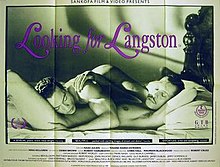Looking for Langston
| Looking for Langston | |
|---|---|

UK theatrical release poster
|
|
| Directed by | Isaac Julien |
| Produced by | Nadine March-Edwards |
| Written by | Isaac Julien (screenplay) |
| Starring | Ben Ellison Matthew Baidoo Akim Mogaji John Wilson Dencil Williams Guy Burgess James Dublin Harry Donaldson Jimmy Somerville Langston Hughes as himself |
| Music by | Wayson Jones Trevor Mathison Peter Spencer |
| Cinematography | Nina Kellgren |
|
Production
company |
Sankofa Film & Video Productions
|
| Distributed by | British Film Institute |
|
Release date
|
(Berlin International Film Festival) |
|
Running time
|
42 minutes |
| Language | English |
Looking for Langston is a 1989 British black-and-white film, directed by Isaac Julien and produced by Sankofa Film & Video Productions. It combines authentic archival newsreel footage of Harlem in the 1920s with scripted scenes to produce a non-linear impressionistic storyline celebrating black gay identity and desire during the artistic and cultural period known as the Harlem Renaissance in New York. The film is a short, running at about 42 minutes.
Opening the film is a voice-over of the original radio broadcast made in tribute to Langston Hughes upon his death in 1967 as the scene of his funeral is recreated and reinterpreted. Interspersed among such images as shifting time periods that seamlessly flow from past to present, black men dancing together within a revisionist version of the Cotton Club, or a speakeasy, and dream sequences, are brief narrative extracts from the poetic works of Hughes alongside those of Richard Bruce Nugent, James Baldwin, and Essex Hemphill. Also shown are the controversial images of black men by the photographer Robert Mapplethorpe.
The film is not a biography of Langston Hughes. It is a memoriam to Hughes and the Harlem Renaissance as reconstructed from a black gay perspective. Moreover, it purports to be a meditation on the black gay experience within a historical context built around the homophobia, oppression and denial faced by men of African descent within black communities alongside "allusions and political commentary on white racism."
Hughes is presented as an icon and cultural metaphor for black gay men who were confronted with being ostracized if they did not conform to black bourgeoisie standards whose overriding goal concerned fuller social integration. Contested are the ways the black male and his sexuality have been represented in the modern Western world and how existing notions of race and gender figure within American and African-American culture.
...
Wikipedia
